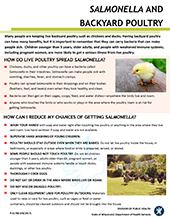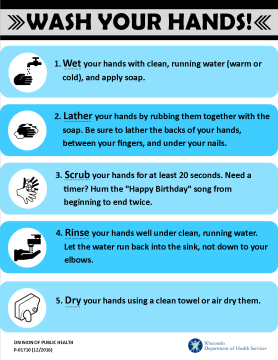Backyard Poultry
Many people are keeping live backyard poultry such as chickens and ducks. Having backyard poultry can have many benefits, but it is important to remember that poultry can carry germs that can make people sick. Live poultry can carry Salmonella or Campylobacter bacteria even though they are clean and show no signs of being sick.
Salmonella and Campylobacter bacteria can cause people to have diarrhea, vomiting, fever, and abdominal cramps. Most people recover from these illnesses without treatment. However, in some people, the diarrhea may be so severe that the person needs to be hospitalized.
Washing your hands thoroughly after touching live poultry and before preparing food for cooking are important steps to reduce your chances of getting sick from backyard poultry.
See the Department of Health Services (DHS) Outbreaks in Wisconsin webpage for information on Salmonellosis outbreaks linked to backyard poultry.
Frequently asked questions
Poultry can spread Salmonella in their droppings and on their bodies (feathers, feet, and beaks) even when they look healthy and clean. The germs can then get on their cages, coops, feed and water dishes—pretty much anywhere the birds live and roam. Anyone who touches the birds or who works or plays in the areas they roam is at risk for getting Salmonella and Campylobacter.
People can get sick from Salmonella and Campylobacter when the germs get into their mouths from contact with objects contaminated with the germs. This happens frequently when someone touches poultry and does not properly wash their hands afterwards.
The signs and symptoms of a Salmonella infection are:
- Nausea
- Vomiting
- Stomach cramps
- Diarrhea
- Fever
- Chills
- Headache
- Blood in stool
The signs and symptoms of a Campylobacter infection are:
- Cramping stomach pain
- Fever
- Nausea
- Vomiting
- Watery diarrhea, sometimes bloody
Children younger than 5 years, older adults, pregnant women and people with weakened immune systems should not touch live poultry.
They are at higher risk for becoming ill if they come into contact with Salmonella and Campylobacter bacteria.
Because Salmonella and Campylobacter infections can cause diarrhea, they may make you become dehydrated.
Making sure to drink plenty of fluids is important to prevent dehydration. Sometimes, it may be necessary to go to the hospital to receive fluids if you become severely dehydrated. Antibiotics may be prescribed if you have a severe infection.
- Wash your hands with soap and water right after touching live poultry or anything in the area where they live and roam. Use hand sanitizer if soap and water are not available.
- Supervise handwashing of young children.
- Some people should not touch poultry. Do not let children younger than 5 years, older adults, pregnant women, and people with weakened immune systems handle or touch chicks, ducklings, or other live poultry.
- Do not kiss or snuggle poultry.
- Poultry should stay outside even when they are babies. Do not let live poultry inside the house, in bathrooms, or especially in areas where food or drink is prepared, served, or stored.
- Equipment used for poultry should only be cleaned outdoors. Materials used to raise or care for live poultry, such as cages or feed or water containers, should be cleaned outdoors and should not be brought into the house.
- Do not eat or drink in an area where birds live or roam.
- Thoroughly cook eggs.
Having backyard poultry can have many benefits, but it is important to remember that they can carry bacteria that can make people sick.
Children younger than 5 years, older adults, and people with weakened immune systems, including pregnant women, are more likely to get a serious illness from live poultry.
Check your state and local ordinances before selecting or buying baby chicks, adult poultry (hens, roosters), or waterfowl.
Many jurisdictions have rules regarding the number and sex of birds that can be owned.
Resources
DHS resources
Salmonella and Backyard Poultry, P-01788 (PDF) includes information on how poultry spread Salmonella and how to reduce your chances of becoming ill from backyard poultry.
Wash Your Hands!, P-01710 (PDF) outlines five steps needed to thoroughly wash your hands.
Salmonellosis fact sheet, P-42088 (PDF)
Campylobacter fact sheet, P-42034 (PDF)
Other resources
Keeping Backyard Poultry - CDC (Centers for Disease Control and Prevention, includes information on reducing the likelihood of a Salmonella infection while raising backyard poultry.
Healthy People Healthy Pets - CDC, contains information on the health benefits of pets and disease risks.
Salmonella information - CDC, contains detailed information on Salmonella infections, including statistics.


